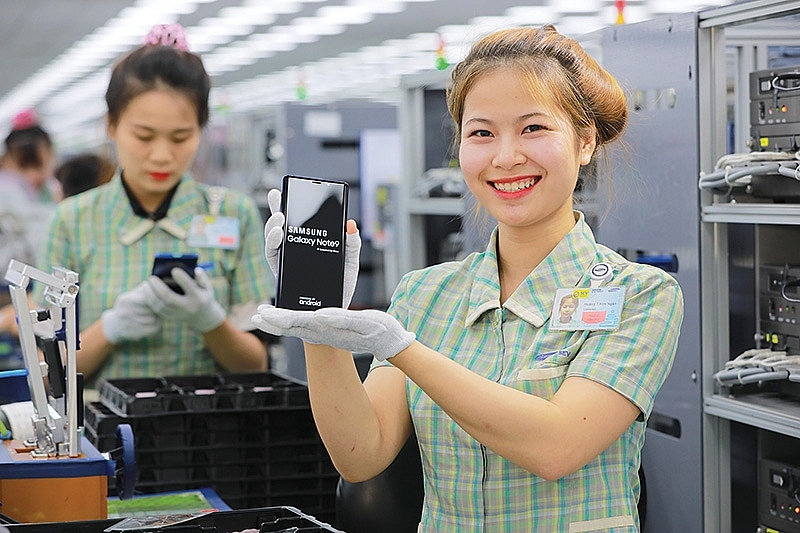Social activities at heart of Samsung
 |
| Samsung has done much for localities and people across Vietnam |
Nguyen Duy Thanh was born and raised in Chau Thanh district, Ben Tre province, a peaceful land over 90 kilometres from Ho Chi Minh City. Three years ago, he was a quiet young man with a burning passion for IT.
Since returning from the WorldSkills Competition 2015 in Brazil where he became the first Vietnamese contestant to win a bronze medal in Information Technology Software Solutions since the country first took part in the competition in 2007, Thanh is now more virile, mature, animated, and is currently one of the outstanding employees of Samsung’s Vietnam Mobile Research and Development Centre (SVMC).
Following that first bronze medal for Vietnam in 2015, the Vietnamese flag once again flew high two years later at the awards ceremony of the 44th WorldSkills Competition 2017 in Abu Dhabi. There, Nguyen Ba Phuoc also walked away with a bronze medal in Information Technology Software Solutions. Both Thanh and Phuoc were selected, supported, and trained by Samsung for the competition.
Following these successes, in May 2018 Samsung signed a Memorandum of Understanding with the Directorate of Vocational Education and Training to support and train Vietnamese contestants and experts for the 45th WorldSkills Competition 2019 in Kazan, Russia. Throughout this programme, Samsung will provide training in mechatronics, a key field of 4.0 technology that will be of vital use during the competition.
The achievements of these two candidates demonstrate the effective support that Samsung offers to Vietnamese talent in the IT arena and serve as an inspiration for the younger generations of Vietnam, while at the same time asserting to the world the intelligence, skilful workmanship, as well as the efforts and determination of Vietnamese people.
The inspiring achievements of the Vietnamese contestants at the WorldSkills Competition in particular are just some of the moments of joy and triumph seen during Samsung’s 10-year journey to grow along with and elevate the community around it.
Samsung’s social initiatives started from the inside in 2010 with the company’s voluntary blood donation programme “Chung dong mau Viet.” Since its inception, the programme mobilised more than 100,000 employees to donate a total of 62,000 units of blood so far. In 2018, Samsung also organised the “Tiep lua thanh xuan” blood donation programme, collecting an astounding 17,774 units of blood from 21,978 employees.
Alongside its workforce initiatives, aiming to raise the new generation of Vietnamese engineers and tech experts, Samsung has provided 120 scholarships worth VND50 million ($2,170) each to outstanding senior technology students. Running annually in Vietnam since 2015, the Samsung Collegiate Programming Competition is another activity under the Samsung Talent Programme which creates a useful intellectual playground for Vietnamese IT students.
Apart from raising IT and tech talent, Samsung’s corporate social responsibility activities take a more holistic approach to promote education among Vietnamese youth by building schools for poor students in Bac Ninh and Thai Nguyen. The corporation is also planning to build another school in Ho Chi Minh City.
Another major community programme is the Hope Village project under which Samsung Vietnam has provided VND22 billion ($956,500) to support hundreds of poor households in Cao Bang and Thai Nguyen to buy buffalos. After two years, the project now includes a training programme to boost farmer productivity and improve living standards in the two localities.
Samsung also implements numerous other annual community activities, such as supporting flood victims, providing wheelchairs, and donating water filtration systems to 10 kindergartens in Bac Ninh and Thai Nguyen, as well as improving and installing water filtration systems for 26 primary and secondary schools in Bac Giang province.
Over the past 10 years, Samsung has been striving to contribute to the development of this dynamically growing market and its people, wishing to grow along the communities where it operates.
What the stars mean:
★ Poor ★ ★ Promising ★★★ Good ★★★★ Very good ★★★★★ Exceptional
Related Contents
Latest News
More News
- Swing for the Kids charity golf tournament kicks off (October 13, 2024 | 09:00)
- Hundreds gather at 2024 Swing for the Kids charity golf tournament (October 12, 2024 | 17:00)
- Swing for the Kids 2024 tees up opportunities for Vietnam's youth (October 12, 2024 | 10:00)
- Empowering the next generation (October 09, 2024 | 17:31)
- Swing for the Kids 2024 continues to empower Vietnam's future generations (October 09, 2024 | 17:16)
- The promising future of Vietnam’s golf tourism (October 09, 2024 | 16:56)
- Swing for the Kids scholarship motivated by beneficiary’s kindness and maturity (October 08, 2024 | 12:35)
- VIR's Swing for the Kids golf tournament set for Hanoi (October 04, 2024 | 17:46)
- Swing for the Kids scholarships delivered to underprivileged students in Ha Tinh (May 14, 2024 | 19:12)
- Scholarships awarded to students in Nghe An province (May 14, 2024 | 18:53)

 Tag:
Tag:




















 Mobile Version
Mobile Version